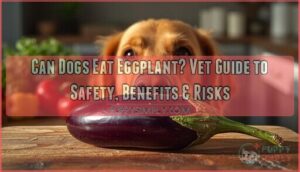This site is supported by our readers. We may earn a commission, at no cost to you, if you purchase through links.

You spot your curious pup eyeing the glossy purple vegetable on your cutting board, and suddenly you’re second-guessing your dinner prep. Eggplant sits in a gray area for many dog owners—it’s not chocolate or grapes, but it belongs to the nightshade family, which raises legitimate safety questions.
The truth is, while plain cooked eggplant flesh won’t poison your furry friend, the plant’s stems, leaves, and even raw flesh contain solanine, a compound that can trigger everything from stomach upset to more serious reactions.
Whether eggplant earns a spot in your dog’s diet depends on proper preparation, portion control, and your individual pet’s health status.
Table Of Contents
- Key Takeaways
- Can Dogs Eat Eggplant Safely?
- Nutritional Benefits of Eggplant for Dogs
- Potential Risks and Side Effects
- How to Prepare Eggplant for Dogs
- When Should Dogs Avoid Eggplant?
- Frequently Asked Questions (FAQs)
- Can my dog eat cooked eggplant?
- What are the signs of eggplant poisoning in dogs?
- Is fried eggplant with egg good for dogs?
- Can dogs eat fruits & vegetables?
- Are eggplants poisonous to dogs?
- Can dogs eat breaded eggplant?
- Are eggplants good for dogs?
- Are eggplants toxic to dogs?
- What vegetables dogs Cannot eat?
- Can dogs eat zucchini or eggplant?
- Conclusion
Key Takeaways
- Plain cooked eggplant flesh is safe for dogs in small portions, but stems, leaves, and raw flesh contain solanine—a compound that can cause vomiting, weakness, and digestive upset.
- Proper preparation matters: always steam or bake eggplant without seasonings, peel the skin, remove seeds, and serve portions based on your dog’s size (one teaspoon for small breeds, up to three tablespoons for extra-large dogs).
- Dogs with kidney problems, arthritis, or food sensitivities should avoid eggplant entirely since its oxalate content can worsen kidney stones and trigger digestive issues.
- Watch for allergic reactions like hives, facial swelling, or itching within hours of feeding, and contact your vet immediately if you notice signs of solanine poisoning such as drooling, lethargy, or difficulty breathing.
Can Dogs Eat Eggplant Safely?
Yes, dogs can eat eggplant safely when it’s properly prepared and served in moderation. This purple vegetable isn’t toxic to your furry friend, but there are important guidelines you’ll need to follow to keep your dog healthy and happy.
If you’re wondering about dishes like eggplant parmesan, check out whether dogs can safely eat eggplant parmesan since the added ingredients can make a big difference.
Let’s look at what you need to know about eggplant safety, how it affects your dog’s body, and which varieties are safe to serve.
Is Eggplant Toxic or Safe for Dogs?
Eggplant flesh is generally safe for dogs when properly prepared, but certain parts pose real risks. The leaves, stems, and flowers contain higher levels of solanine, a natural toxin that can trigger stomach upset, weakness, or breathing difficulties if your furry friend eats them.
Stick to plain, cooked flesh in small amounts, and you’ll keep canine dietary needs and pet safety front and center. For more guidance on eggplant safe preparation tips, visit a veterinarian-endorsed resource.
How Eggplant Affects Canine Health
When you add cooked eggplant to your pup’s bowl, the fiber content promotes steady bowel movements and can ease digestive sensitivities. Its modest vitamins and antioxidants contribute to canine wellness without replacing complete dog food alternatives.
However, solanine in raw or overripe flesh may trigger stomach upset. That’s why moderation matters—healthy treat options work best when they complement, not replace, your dog’s balanced diet for ideal canine health.
For more details on, always review reputable pet nutrition guides.
Types of Eggplant Dogs Can Eat
Most dog-friendly eggplant varieties include the familiar purple globe type, which you’ll find in most grocery stores.
Cooked options like steamed or baked pieces offer safer canine nutrition than raw flesh. Plain eggplant without seasonings minimizes solanine exposure and promotes eggplant safety.
Stick with soft, seed-free portions to keep your furry friend comfortable and healthy.
Nutritional Benefits of Eggplant for Dogs
Eggplant isn’t just safe for your dog—it actually packs some solid nutritional value when you prepare it right. This veggie brings a handful of health perks to the table, from supporting digestion to boosting your furry friend’s immune system.
Let’s look at what makes eggplant a worthwhile addition to your dog’s treat rotation.
Fiber Content and Digestive Health
Think of dietary fiber as your dog’s internal broom—it sweeps through the digestive system, adding bulk to stool and bolstering regularity. Eggplant delivers both soluble and insoluble fiber, promoting gut health and digestive balance.
Just as mung beans offer similar digestive benefits when introduced gradually, eggplant should be added slowly to avoid any stomach upset.
Eggplant’s fiber acts like an internal broom for dogs, sweeping through their digestive system to support regularity and gut health
This fiber also feeds beneficial gut bacteria, strengthening the microbiome and enhancing gastrointestinal health. The result? Improved stool quality and canine nutrition that bolsters your furry friend’s overall wellness.
Antioxidants and Immune Support
Cellular protection becomes critical when your dog’s body fights off disease. Eggplant delivers antioxidants that neutralize free radicals, reducing oxidative stress and supporting immune system function. These antioxidant benefits, combined with nutrient balance, help maintain your dog’s defenses:
- Anthocyanins boost immune cell activity
- Chlorogenic acid reduces inflammatory responses
- Vitamins C and A regenerate protective compounds
- Polyphenols strengthen lymphocyte function
- Natural compounds support overall immune support
Essential Vitamins and Minerals
Vitamin balance plays a vital role in your dog’s health, and eggplant provides several key nutrients. You’ll find vitamins A, C, and K supporting vision, immune function, and proper blood clotting.
Minerals like potassium and manganese contribute to muscle function and bone metabolism. While eggplant can’t prevent mineral deficiency alone, it enhances nutrient absorption when paired with complete canine nutrition.
Potential Risks and Side Effects
While eggplant offers nutritional benefits, it’s not without potential downsides for your furry friend. Some dogs may experience adverse reactions, ranging from mild digestive discomfort to more serious health concerns.
Let’s examine the key risks you should be aware of before adding eggplant to your dog’s diet.
Solanine Toxicity and Symptoms
While eggplant belongs to the nightshade family, you don’t need to panic. Solanine toxicity occurs mainly when your dog eats large amounts of raw eggplant, green parts, or stems where toxicity levels concentrate.
Watch for nausea, vomiting, diarrhea, or weakness—these signal solanine poisoning. Cooking greatly aids in solanine removal, making properly prepared eggplant much safer.
Proper symptom diagnosis helps you catch vegetable toxicity early.
Allergic Reactions and Sensitivities
Just like some people react to certain foods, your dog can develop allergic reactions to eggplant, especially if they’ve sensitivities to nightshade plants.
Watch for canine allergy symptoms—itchy skin, hives, swelling around the face, or excessive scratching after feeding. Food allergies in dogs trigger immune responses that may cause skin irritation or respiratory signs.
Stop feeding eggplant immediately if you notice these canine hypersensitivity reactions.
Digestive Upset and Gastrointestinal Issues
Introducing eggplant suddenly can throw your dog’s digestive health off balance, triggering stomach problems within 24 hours. Gut inflammation often starts mild but escalates if you ignore early warning signs of gastrointestinal health concerns.
Watch for these digestive issues that signal intestinal care is needed:
- Vomiting or diarrhea within a day of feeding
- Gas, bloating, or abdominal discomfort
- Appetite loss lasting 12 to 48 hours
- Lethargy from digestive system stress
Impact on Dogs With Health Conditions
If your dog has kidney issues, eggplant’s potassium levels require careful consideration in their dietary restrictions. Dogs with chronic conditions need customized canine nutrition to prevent complications that affect their overall dog health.
Health Condition | Eggplant Considerations
— | —
Kidney disease | Monitor potassium intake carefully
Food allergies | Watch for nightshade sensitivities
Digestive health problems | Start with tiny portions
Always seek veterinary guidance before introducing eggplant to dogs with pre-existing eggplant allergies or chronic health concerns.
How to Prepare Eggplant for Dogs
Preparing eggplant properly can make all the difference between a safe treat and a potential stomach issue for your furry friend. The good news is that with a few simple steps, you can turn this nutritious vegetable into a dog-friendly snack.
Here’s what you need to know about getting eggplant ready for your pup.
Washing, Peeling, and Removing Seeds
Before offering your furry friend any eggplant, you’ll need to prep it properly for safe digestion. Rinse the vegetable under cool running water for 15 to 30 seconds, then peel away the skin with a vegetable peeler since it’s tough for dogs to break down.
Next, slice lengthwise and scoop out the seeds with a spoon—they’re harder to digest and best removed entirely.
Safe Cooking Methods (Steaming, Boiling, Baking)
Once prepped, steaming, boiling, or baking are your best cooking techniques for nutrient retention and food safety.
Steaming preserves vitamins while keeping pieces tender—just place eggplant over simmering water for about 8 minutes. Boiling works quickly but can leach minerals into the water. Baking at 350°F for 20 minutes creates soft, digestible cooked eggplant.
Whatever method you choose, skip all seasonings for proper dog food safety.
Avoiding Harmful Additives and Seasonings
Even plain cooked eggplant loses its safety margin if you add the wrong toppings. Salt, garlic, onion, and artificial seasonings turn a healthy snack into toxic substances for dogs, triggering anything from stomach upset to serious food allergies.
Always check pet food labels and choose additive-free foods:
- Skip garlic, onion, and related toxic ingredients
- Avoid added salt or heavy sauces
- Eliminate artificial colors like tartrazine
- Never use xylitol or artificial sweeteners
- Rely on natural alternatives—steamed eggplant needs no extras
Your vet can suggest safe seasonings if needed, but unseasoned is usually best for dog food safety and vegetable safety.
Portion Sizes Based on Dog Size
Once you’ve prepped plain, cooked eggplant, dog weight guidelines dictate how much to offer. Size-based portions prevent stomach upset while respecting calorie intake and canine dietary needs.
Small pups under 20 pounds can handle up to one teaspoon, medium breeds get one tablespoon, large dogs two tablespoons, and extra-large canines three tablespoons—always in moderation, following feeding charts for safe meal frequency.
When Should Dogs Avoid Eggplant?
While eggplant can be a healthy treat for many dogs, it’s not the right choice for every furry friend. Certain health conditions, allergies, and sensitivities mean some dogs should steer clear of this purple vegetable entirely.
Let’s look at the specific situations where eggplant should stay off your dog’s plate.
Dogs With Kidney or Digestive Problems
If your furry friend struggles with kidney stones or gastrointestinal health issues, eggplant isn’t the best choice. Its oxalate content can worsen kidney stone prevention efforts and complicate renal diet planning.
Dogs with food sensitivities often experience digestive upset from eggplant, which works against gut health management and digestive enzyme support.
Canine nutrition therapy for dog health risks requires avoiding foods that stress compromised systems, making eggplant particularly risky for canine dietary needs in these cases.
Identifying and Responding to Allergic Reactions
Watch for classic allergy symptoms like hives, facial swelling, or itching within minutes to hours after your dog eats eggplant. Reaction timing varies, but severe anaphylaxis signs—difficulty breathing, throat swelling, collapse—demand immediate emergency response.
Stop allergen removal by preventing further eggplant exposure, and contact your vet right away. Food allergies in dogs, though uncommon with eggplant, require quick action to protect your companion’s health.
Consulting Your Veterinarian for Dietary Advice
Before adding any new food to your dog’s diet, always check with your vet for customized nutrition planning. They’ll conduct a thorough diet assessment, review your pet’s health history, and provide veterinary guidance customized to your companion’s needs.
This proactive approach to pet wellness ensures health monitoring catches potential issues early, keeping dog nutrition and health on track while minimizing dog health risks.
Frequently Asked Questions (FAQs)
Can my dog eat cooked eggplant?
Yes, your dog can eat cooked eggplant in small amounts. Plain steamed or baked eggplant without seasonings offers safe Pet Health Benefits, supporting dog nutrition and health when introduced gradually as an occasional treat.
What are the signs of eggplant poisoning in dogs?
Most eggplant toxicity cases involve gastrointestinal upset. Vomiting symptoms usually appear first, followed by lethargy and diarrhea.
Watch for drooling, abdominal pain, or weakness—these toxic reactions from solanine warrant emergency care immediately.
Is fried eggplant with egg good for dogs?
No, fried eggplant isn’t ideal for dogs. The heavy oils can trigger pancreatitis, while egg allergies and fried food dangers make this combination risky.
Stick with plain, steamed options for safer pet nutrition instead.
Can dogs eat fruits & vegetables?
Many fruits and vegetables offer excellent healthy snacks for canine wellness, providing fiber, vitamins, and antioxidants that support pet diets.
However, always verify veggie benefits and vegetable safety, as some produce items pose risks to canine dietary needs.
Are eggplants poisonous to dogs?
Technically, this nightshade family member isn’t poisonous when cooked and peeled, but the leaves, stems, and raw flesh contain solanine—a toxic substance for dogs that can cause vomiting and weakness in large amounts.
Can dogs eat breaded eggplant?
Breaded preparations aren’t your furry friend’s best bet. The breading adds oils, salt, and sometimes garlic or onions—all of which can upset your dog’s stomach or worse, trigger pancreatitis in sensitive pups.
Are eggplants good for dogs?
Plain, cooked eggplant offers dogs nutritional benefits like fiber, antioxidants, and vitamins A, C, and K.
When prepared correctly and fed in moderation, it’s a healthy treat option supporting canine wellness and digestive health.
Are eggplants toxic to dogs?
Properly prepared eggplant poses minimal toxicity levels to most dogs, though solanine—a nightshade family compound—can cause plant poisoning if consumed in large amounts, particularly from leaves, stems, or unripe fruit.
What vegetables dogs Cannot eat?
Dogs should avoid onions, garlic, rhubarb, unripe tomatoes, wild mushrooms, and green potatoes.
These toxic plants contain compounds that damage red blood cells, irritate kidneys, or cause serious gastrointestinal upset and neurological symptoms.
Can dogs eat zucchini or eggplant?
Yes, both zucchini and eggplant are safe for dogs when prepared properly. Serve them plain, cooked, and in small portions as healthy treats—always watching for any digestive upset or allergic reactions.
Conclusion
You’ve likely heard that nightshade vegetables spell trouble for pets, but with eggplant, the reality is more nuanced. Plain, cooked eggplant flesh—stripped of stems, leaves, and excess skin—won’t harm most dogs in small amounts. The key lies in preparation and moderation.
If your pup has kidney issues, arthritis, or shows any digestive sensitivity, skip it entirely. When in doubt, your veterinarian can help determine whether can dogs eat eggplant applies safely to your individual companion.
- https://fdc.nal.usda.gov/fdc-app.html
- https://en.wikipedia.org/wiki/Eggplant
- https://www.sciencedirect.com/topics/neuroscience/chlorogenic-acid
- https://www.healthline.com/health/most-nutritious-nightshade-plants
- https://pangovet.com/talk-to-a-vet-online-dog-ate-drank-something/?utm_source=dogster&utm_medium=article&utm_campaign=dog_eat_drink&utm_content=can-dogs-eat-eggplant













